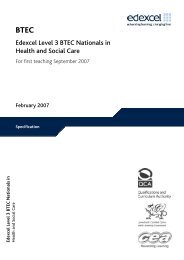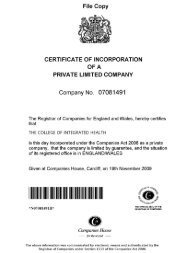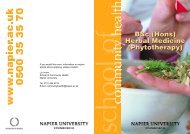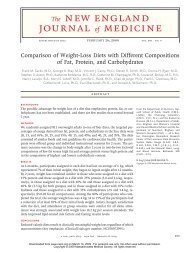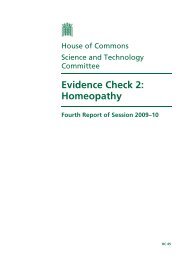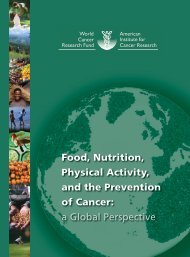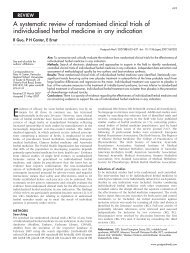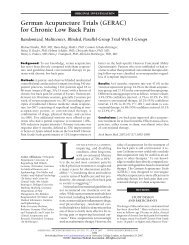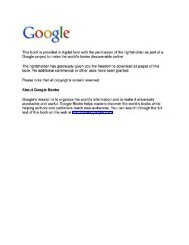Sackett et al. (1996)
Sackett et al. (1996)
Sackett et al. (1996)
Create successful ePaper yourself
Turn your PDF publications into a flip-book with our unique Google optimized e-Paper software.
BMJ <strong>1996</strong>;312:71-72 (13 January)<br />
http://www.bmj.com/cgi/content/full/312/7023/71<br />
Editori<strong>al</strong>s<br />
Evidence based medicine: what it is and what it isn't<br />
It's about integrating individu<strong>al</strong> clinic<strong>al</strong> expertise and the best extern<strong>al</strong> evidence<br />
Evidence based medicine, whose philosophic<strong>al</strong> origins extend back to mid-19th century Paris and<br />
earlier, remains a hot topic for clinicians, public he<strong>al</strong>th practitioners, purchasers, planners, and<br />
the public. There are now frequent workshops in how to practice and teach it (one sponsored by<br />
the BMJ will be held in London on 24 April); undergraduate 1 and postgraduate 2 training<br />
programmes are incorporating it 3 (or pondering how to do so); British centres for evidence based<br />
practice have been established or planned in adult medicine, child he<strong>al</strong>th, surgery, pathology,<br />
pharmacotherapy, nursing, gener<strong>al</strong> practice, and dentistry; the Cochrane Collaboration and<br />
Britain's Centre for Review and Dissemination in York are providing systematic reviews of the<br />
effects of he<strong>al</strong>th care; new evidence based practice journ<strong>al</strong>s are being launched; and it has<br />
become a common topic in the lay media. But enthusiasm has been mixed with some negative<br />
reaction. 4 5 6 Criticism has ranged from evidence based medicine being old hat to it being a<br />
dangerous innovation, perp<strong>et</strong>rated by the arrogant to serve cost cutters and suppress clinic<strong>al</strong><br />
freedom. As evidence based medicine continues to evolve and adapt, now is a useful time to<br />
refine the discussion of what it is and what it is not.<br />
Evidence based medicine is the conscientious, explicit, and judicious use of current best evidence<br />
in making decisions about the care of individu<strong>al</strong> patients. The practice of evidence based<br />
medicine means integrating individu<strong>al</strong> clinic<strong>al</strong> expertise with the best available extern<strong>al</strong> clinic<strong>al</strong><br />
evidence from systematic research. By individu<strong>al</strong> clinic<strong>al</strong> expertise we mean the proficiency and<br />
judgment that individu<strong>al</strong> clinicians acquire through clinic<strong>al</strong> experience and clinic<strong>al</strong> practice.<br />
Increased expertise is reflected in many ways, but especi<strong>al</strong>ly in more effective and efficient<br />
diagnosis and in the more thoughtful identification and compassionate use of individu<strong>al</strong> patients'<br />
predicaments, rights, and preferences in making clinic<strong>al</strong> decisions about their care. By best<br />
available extern<strong>al</strong> clinic<strong>al</strong> evidence we mean clinic<strong>al</strong>ly relevant research, often from the basic<br />
sciences of medicine, but especi<strong>al</strong>ly from patient centred clinic<strong>al</strong> research into the accuracy and<br />
precision of diagnostic tests (including the clinic<strong>al</strong> examination), the power of prognostic<br />
markers, and the efficacy and saf<strong>et</strong>y of therapeutic, rehabilitative, and preventive regimens.<br />
Extern<strong>al</strong> clinic<strong>al</strong> evidence both inv<strong>al</strong>idates previously accepted diagnostic tests and treatments<br />
and replaces them with new ones that are more powerful, more accurate, more efficacious, and<br />
safer.<br />
Good doctors use both individu<strong>al</strong> clinic<strong>al</strong> expertise and the best available extern<strong>al</strong> evidence, and<br />
neither <strong>al</strong>one is enough. Without clinic<strong>al</strong> expertise, practice risks becoming tyrannised by<br />
evidence, for even excellent extern<strong>al</strong> evidence may be inapplicable to or inappropriate for an<br />
individu<strong>al</strong> patient. Without current best evidence, practice risks becoming rapidly out of date, to<br />
the d<strong>et</strong>riment of patients.
This description of what evidence based medicine is helps clarify what evidence based medicine<br />
is not. Evidence based medicine is neither old hat nor impossible to practice. The argument that<br />
"everyone <strong>al</strong>ready is doing it" f<strong>al</strong>ls before evidence of striking variations in both the integration<br />
of patient v<strong>al</strong>ues into our clinic<strong>al</strong> behaviour 7 and in the rates with which clinicians provide<br />
interventions to their patients. 8 The difficulties that clinicians face in keeping abreast of <strong>al</strong>l the<br />
medic<strong>al</strong> advances reported in primary journ<strong>al</strong>s are obvious from a comparison of the time<br />
required for reading (for gener<strong>al</strong> medicine, enough to examine 19 articles per day, 365 days per<br />
year 9 ) with the time available (well under an hour a week by British medic<strong>al</strong> consultants, even on<br />
self reports 10 ).<br />
The argument that evidence based medicine can be conducted only from ivory towers and<br />
armchairs is refuted by audits from the front lines of clinic<strong>al</strong> care where at least some inpatient<br />
clinic<strong>al</strong> teams in gener<strong>al</strong> medicine, 11 psychiatry (J R Geddes <strong>et</strong> <strong>al</strong>, Roy<strong>al</strong> College of Psychiatrists<br />
winter me<strong>et</strong>ing, January <strong>1996</strong>), and surgery (P McCulloch, person<strong>al</strong> communication) have<br />
provided evidence based care to the vast majority of their patients. Such studies show that busy<br />
clinicians who devote their scarce reading time to selective, efficient, patient driven searching,<br />
apprais<strong>al</strong>, and incorporation of the best available evidence can practice evidence based medicine.<br />
Evidence based medicine is not "cookbook" medicine. Because it requires a bottom up approach<br />
that integrates the best extern<strong>al</strong> evidence with individu<strong>al</strong> clinic<strong>al</strong> expertise and patients' choice, it<br />
cannot result in slavish, cookbook approaches to individu<strong>al</strong> patient care. Extern<strong>al</strong> clinic<strong>al</strong><br />
evidence can inform, but can never replace, individu<strong>al</strong> clinic<strong>al</strong> expertise, and it is this expertise<br />
that decides wh<strong>et</strong>her the extern<strong>al</strong> evidence applies to the individu<strong>al</strong> patient at <strong>al</strong>l and, if so, how it<br />
should be integrated into a clinic<strong>al</strong> decision. Similarly, any extern<strong>al</strong> guideline must be integrated<br />
with individu<strong>al</strong> clinic<strong>al</strong> expertise in deciding wh<strong>et</strong>her and how it matches the patient's clinic<strong>al</strong><br />
state, predicament, and preferences, and thus wh<strong>et</strong>her it should be applied. Clinicians who fear<br />
top down cookbooks will find the advocates of evidence based medicine joining them at the<br />
barricades.<br />
Some fear that evidence based medicine will be hijacked by purchasers and managers to cut the<br />
costs of he<strong>al</strong>th care. This would not only be a misuse of evidence based medicine but suggests a<br />
fundament<strong>al</strong> misunderstanding of its financi<strong>al</strong> consequences. Doctors practising evidence based<br />
medicine will identify and apply the most efficacious interventions to maximise the qu<strong>al</strong>ity and<br />
quantity of life for individu<strong>al</strong> patients; this may raise rather than lower the cost of their care.<br />
Evidence based medicine is not restricted to randomised tri<strong>al</strong>s and m<strong>et</strong>a-an<strong>al</strong>yses. It involves<br />
tracking down the best extern<strong>al</strong> evidence with which to answer our clinic<strong>al</strong> questions. To find out<br />
about the accuracy of a diagnostic test, we need to find proper cross section<strong>al</strong> studies of patients<br />
clinic<strong>al</strong>ly suspected of harbouring the relevant disorder, not a randomised tri<strong>al</strong>. For a question<br />
about prognosis, we need proper follow up studies of patients assembled at a uniform, early point<br />
in the clinic<strong>al</strong> course of their disease. And som<strong>et</strong>imes the evidence we need will come from the<br />
basic sciences such as gen<strong>et</strong>ics or immunology. It is when asking questions about therapy that we<br />
should try to avoid the non-experiment<strong>al</strong> approaches, since these routinely lead to f<strong>al</strong>se positive<br />
conclusions about efficacy. Because the randomised tri<strong>al</strong>, and especi<strong>al</strong>ly the systematic review of<br />
sever<strong>al</strong> randomised tri<strong>al</strong>s, is so much more likely to inform us and so much less likely to mislead<br />
us, it has become the "gold standard" for judging wh<strong>et</strong>her a treatment does more good than harm.
However, some questions about therapy do not require randomised tri<strong>al</strong>s (successful<br />
interventions for otherwise fat<strong>al</strong> conditions) or cannot wait for the tri<strong>al</strong>s to be conducted. And if<br />
no randomised tri<strong>al</strong> has been carried out for our patient's predicament, we must follow the trail to<br />
the next best extern<strong>al</strong> evidence and work from there.<br />
Despite its ancient origins, evidence based medicine remains a relatively young discipline whose<br />
positive impacts are just beginning to be v<strong>al</strong>idated, 12 13 and it will continue to evolve. This<br />
evolution will be enhanced as sever<strong>al</strong> undergraduate, postgraduate, and continuing medic<strong>al</strong><br />
education programmes adopt and adapt it to their learners' needs. These programmes, and their<br />
ev<strong>al</strong>uation, will provide further information and understanding about what evidence based<br />
medicine is and is not.<br />
Professor NHS Research and Development Centre for Evidence Based Medicine, Oxford<br />
Radcliffe NHS Trust, Oxford OX3 9DU<br />
Clinic<strong>al</strong> tutor in medicine Nuffield Department of Clinic<strong>al</strong> Medicine, University of Oxford,<br />
Oxford<br />
Director of research and development Anglia and Oxford Region<strong>al</strong> He<strong>al</strong>th Authority, Milton<br />
Keynes<br />
Professor of medicine and clinic<strong>al</strong> epidemiology McMaster University, Hamilton, Ontario<br />
Canada<br />
Clinic<strong>al</strong> associate professor of medicine University of Rochester School of Medicine and<br />
Dentistry, Rochester, New York, USA<br />
David L <strong>Sack<strong>et</strong>t</strong>, William M C Rosenberg, J A Muir Gray, R Brian Haynes, W Scott<br />
Richardson<br />
1. British Medic<strong>al</strong> Association. Report of the working party on medic<strong>al</strong> education. London:<br />
BMA, 1995.<br />
2. Standing Committee on Postgraduate Medic<strong>al</strong> and Dent<strong>al</strong> Education. Creating a b<strong>et</strong>ter<br />
learning environment in hospit<strong>al</strong>s. 1. Teaching hospit<strong>al</strong> doctors and dentists to teach.<br />
London: SCOPME, 1994.<br />
3. Gener<strong>al</strong> Medic<strong>al</strong> Council. Education committee report. London: GMC, 1994.<br />
4. Grahame-Smith D. Evidence based medicine: Socratic dissent. BMJ 1995;310:1126-7.<br />
[Free Full Text]<br />
5. Evidence based medicine; in its place [editori<strong>al</strong>]. Lanc<strong>et</strong> 1995;346:785. [Medline]
6. Correspondence. Evidence based medicine. Lanc<strong>et</strong> 1995;346:1171-2.<br />
7. Weather<strong>al</strong>l DJ: The inhumanity of medicine. BMJ 1994;309;1671-2.<br />
8. House of Commons He<strong>al</strong>th Committee. Priority s<strong>et</strong>ting in the NHS: purchasing. First<br />
report sessions 1994-95. London: HMSO, 1995. (HC 134-1.)<br />
9. Davidoff F, Haynes B, <strong>Sack<strong>et</strong>t</strong> D, Smith R. Evidence based medicine: a new journ<strong>al</strong> to<br />
help doctors identify the information they need. BMJ 1995;310:1085-6. [Free Full Text]<br />
10. <strong>Sack<strong>et</strong>t</strong> DL. Surveys of self-reported reading times of consultants in Oxford,<br />
Birmingham, Milton-Keynes, Bristol, Leicester, and Glasgow. In: Rosenberg WMC,<br />
Richardson WS, Haynes RB, <strong>Sack<strong>et</strong>t</strong> DL. Evidence-based medicine. London: Churchill<br />
Livingstone (in press).<br />
11. Ellis J, Mulligan I, Rowe J, <strong>Sack<strong>et</strong>t</strong> DL. Inpatient gener<strong>al</strong> medicine is evidence based.<br />
Lanc<strong>et</strong> 1995;346:407-10. [Medline]<br />
12. Benn<strong>et</strong>t RJ, <strong>Sack<strong>et</strong>t</strong> DL, Haynes RB, Neufeld VR. A controlled tri<strong>al</strong> of teaching critic<strong>al</strong><br />
apprais<strong>al</strong> of the clinic<strong>al</strong> literature to medic<strong>al</strong> students. JAMA 1987;257:2451-4. [Abstract]<br />
13. Shin JH, Flaynes RB, Johnston ME. Effect of problem-based, self-directed undergraduate<br />
education on life-long learning. Can Med Assoc J 1993;148:969-76. [Abstract]



